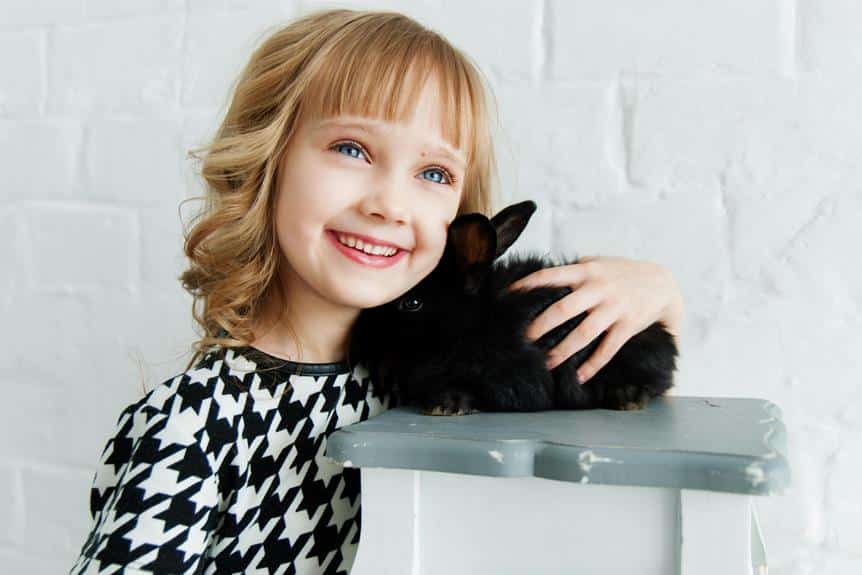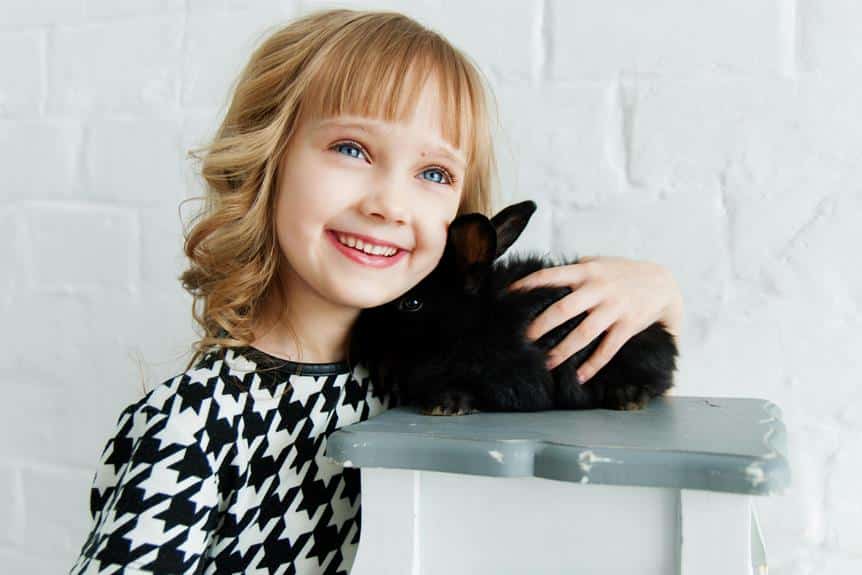Table of Contents
If you've ever noticed your pet rabbit turning away from their usual greens, it could be a sign of an underlying issue. Understanding your rabbit's eating habits is crucial for their overall well-being.
From deciphering the importance of hay in their diet to recognizing signs of potential health concerns, this guide will provide you with essential insights to ensure your furry friend stays happy and healthy.
Ready to unlock the secrets behind your pet rabbit's dining preferences?
Key Takeaways
- High-fiber hay is essential for a rabbit's digestive health and should be the main component of their diet.
- Monitoring weight and food preferences helps maintain healthy eating habits and overall well-being.
- Stress and sudden dietary changes can impact a rabbit's eating behavior and digestive health.
- Consistent feeding schedule, balanced diet, and hydration are crucial for preventing digestive issues in rabbits.
Rabbit's Digestive System Overview
Understanding how a rabbit's digestive system functions is crucial for providing proper care and nutrition for your furry friend. Rabbits have a unique digestive system designed for a high-fiber diet. Gastric motility in rabbits is rapid, with food passing through the stomach quickly to the small intestine. This fast movement is essential for their health, as it helps prevent the buildup of harmful bacteria in their digestive tract.
The small intestine of a rabbit is where most of the nutrient absorption takes place. It's responsible for breaking down and absorbing essential nutrients from their food, such as fiber, vitamins, and minerals. This process is crucial for maintaining your rabbit's overall health and well-being. Ensuring that your rabbit has a diet rich in fiber and nutrients is key to supporting their digestive system and preventing any gastrointestinal issues.
Ideal Diet for Pet Rabbits
To ensure optimal health and well-being for your pet rabbit, it's crucial to provide a balanced and nutritious diet that meets their specific dietary needs. Pet rabbits have specific nutritional requirements that must be met to keep them healthy and happy. A good diet for rabbits should consist mainly of high-quality hay, fresh vegetables, and a small amount of pellets. Hay is essential for their digestive health and should make up the majority of their diet. Fresh vegetables provide essential vitamins and minerals, while pellets can be given in moderation to ensure they receive all necessary nutrients.
When it comes to the feeding schedule, rabbits should have access to fresh hay at all times. Vegetables can be given once or twice a day, and pellets should be limited to about a quarter cup per day, depending on the size of your rabbit. It's important to monitor your rabbit's weight and adjust their diet accordingly to prevent obesity or nutritional deficiencies. Remember, a well-balanced diet is key to keeping your pet rabbit healthy and thriving.
Understanding Hay, Pellets, and Greens
When caring for your pet rabbit, it's crucial to understand the roles of hay, pellets, and greens in their diet.
Hay is essential for promoting proper digestion, while pellets provide the necessary balanced nutrition your rabbit needs.
Incorporating a variety of fresh greens not only adds excitement to their meals but also offers additional nutrients for overall health and well-being.
Hay for Digestive Health
Hay plays a crucial role in maintaining your pet rabbit's digestive health, alongside pellets and greens. Understanding the significance of hay types, benefits, substitutes, and risks is vital for your rabbit's well-being. Here are three key points to consider:
- Hay Types and Benefits: Different types of hay such as timothy, orchard grass, and oat hay provide essential fiber, promote dental health, and aid in proper digestion.
- Hay Substitutes and Risks: While hay substitutes like straw may be tempting, they lack the nutritional value of hay and can lead to digestive issues if used as the main source of fiber.
- Balancing Hay with Other Foods: Ensure that hay remains the primary component of your rabbit's diet, complemented by pellets and fresh greens for a well-rounded nutritional intake.
Pellets for Balanced Nutrition
When providing balanced nutrition for your pet rabbit, incorporating pellets into their diet alongside hay and greens is crucial for their overall health and well-being. Pellets are formulated to provide essential nutrients like fiber, protein, vitamins, and minerals. Look for high-quality pellets with a fiber content of at least 18% to 25%.
It's recommended to feed your rabbit about 1/4 cup of pellets per 5 pounds of body weight daily. However, portion control is vital as overfeeding pellets can lead to obesity and other health issues. Offer pellets once a day and ensure they've unlimited access to fresh hay and water.
Following a consistent feeding schedule will help maintain your rabbit's digestive health and prevent selective eating habits.
Greens for Variety
To provide your pet rabbit with a varied diet essential for their health, incorporating a selection of fresh greens alongside hay and pellets is key.
Key Points to Remember:
- Leafy greens and fruits: Offer a variety of leafy greens like kale, parsley, and romaine lettuce to provide essential nutrients and hydration. Fruits like apples and berries can be given as occasional treats.
- Veggie treats: Introduce veggies like carrots, bell peppers, and broccoli as treats to add diversity to your rabbit's diet and keep them engaged.
- Herbs: Herbs such as cilantro, basil, and mint not only add flavor but also offer additional health benefits to your rabbit's diet.
Signs of Healthy Eating Habits
A crucial indicator of your pet rabbit's healthy eating habits is the presence of consistently firm and well-formed fecal pellets in their living area. Monitoring your rabbit's feces can provide valuable insights into their digestive health. Additionally, observing your rabbit's food preferences can give you a glimpse into their overall well-being. A healthy rabbit will eagerly consume a variety of fresh greens and hay, showing enthusiasm for mealtime.
Weight management is another key aspect of your rabbit's eating habits. Regularly weighing your rabbit and consulting with a veterinarian can help ensure they're maintaining a healthy weight. Monitoring treat frequency is essential; excessive treats can lead to weight gain and other health issues. Establishing a consistent meal schedule for your rabbit promotes good eating habits and prevents overeating.
Common Eating Behavior Concerns
If you notice your pet rabbit experiencing digestive issues like diarrhea or gas, it could be a sign of an underlying problem. Changes in your rabbit's diet or environment can also trigger stress, leading to changes in eating habits.
Understanding these common concerns can help you better care for your furry friend's overall well-being.
Digestive Issues in Rabbits
Digestive issues in rabbits, particularly common eating behavior concerns, are crucial to understand for the health and well-being of your pet bunny. Here are three critical points to consider:
- Gut Motility: Rabbits have a delicate digestive system that requires constant movement to prevent issues like stasis, where the gut slows down or stops functioning correctly.
- Nutrition Absorption: Proper digestion is vital for your rabbit to absorb essential nutrients from their food, ensuring they stay healthy and energetic.
- Hydration: Insufficient water intake can lead to dehydration, impacting digestion and potentially causing serious health problems. Ensure your rabbit always has access to fresh water.
Understanding these aspects can help you identify and address digestive concerns promptly, ensuring your bunny's digestive system stays healthy.
Dietary Changes and Stress
Understanding how dietary changes and stress impact your pet rabbit's eating habits is crucial for maintaining their overall health and well-being. Stress management plays a significant role in your rabbit's diet. High-stress levels can lead to changes in behavior, affecting their food preferences and causing them to eat less or more than usual. It's essential to provide a stable environment and routine to help your rabbit manage stress effectively.
Additionally, maintaining a proper dietary balance is key. Sudden changes in their diet can cause digestive issues and affect their eating habits. When introducing new foods, do so gradually to prevent any disruptions in their digestion. Observing your rabbit's behavior closely can help you identify any signs of stress or discomfort related to dietary changes.
Tips for Improving Your Rabbit's Diet
Wondering how you can enhance your rabbit's diet to ensure their optimal health and well-being? Here are three essential tips to improve your rabbit's diet:
- Nutritional Supplements for Weight Management: Consider adding nutritional supplements to your rabbit's diet to ensure they're getting all the essential vitamins and minerals they need. This can be especially helpful if your rabbit needs help managing their weight. Consult with your veterinarian to determine the right supplements for your rabbit's specific needs.
- Treat Alternatives for Dental Health: Instead of high-sugar treats that can negatively impact your rabbit's dental health, opt for healthier alternatives like fresh vegetables or small pieces of fruit. These options not only provide a tasty snack but also help maintain your rabbit's dental hygiene.
- Regular Hay and Fresh Water: Make sure your rabbit has unlimited access to fresh hay, which is essential for their digestive health. Additionally, always provide fresh water to keep them hydrated and support overall well-being.




